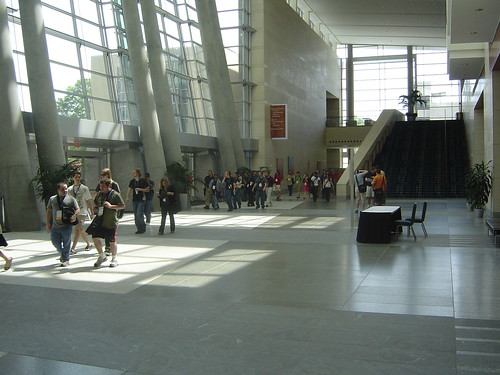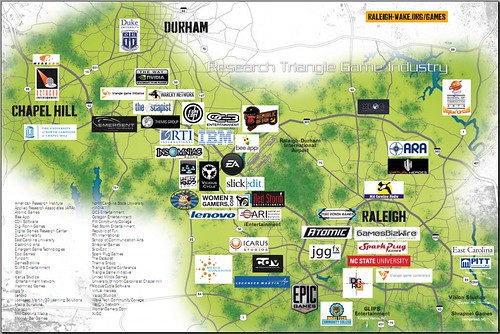by Drew Sikora, Danny Green

Conference Background
Triangle Game Conference held its second annual conference in Raleigh, North Carolina on April 7th and 8th. The conference was held in both the Marriott City Center hotel and the Raleigh Convention Center across the street (and also connected to the Marriott via underground thoroughfare). The name of the conference stems from "the triangle" formed by the three cities clustered in the area - Raleigh, Durham and Chapel Hill. The relationship of which is expressed by this map:

Within this area you will find dozens of game development companies, with a heavy focus on middleware development from companies like Epic Games and Emergent. The area also hosts many universities that have game development programs like North Carolina State and University of Chapel Hill. What you have here is pretty much a self-contained and sustaining game development ecosystem as the schools and companies work closely together to foster development of the next generation of game developers.
Helping in this endeavor is the Triangle Game Initiative, which is also the driving force behind the TGC. The Initiative is a group of local developers not only looking to foster development at the education level, but the government level as well with tax breaks for local companies, for example. TGI is showing the rest of the industry what is possible if local developers band together for a common goal.
When TGI sought out sponsorships from local colleges/universities for the conference, they decided there was no reason to go with just one, but form a group program involving all that included some form of digital media education, which is pretty much all of them - NC State and Chapel Hill in particular have been investing in computer graphics since the late 1960s. NC State also has a Digital Games Research Center which is the primary focus for students attending for the Game Development and other related Bachelor degrees from the college. Wake Tech Community College, the largest community college in the region, offers an AAS degree in Simulation and Game Development. Chapel Hill, as mentioned, runs a computer graphics program and Duke University boasts strength in computational geometry and AI, with a fully-enclosed, six-sided virtual reality environment.
All these schools are participating in support of the Game Development University, which were targeted sessions that can be attended by those who have purchased a discounted Student Pass ($25/day) and provide students knowledge they can apply to their students and continued growth in game development.
Conference Overview
Since this was my first TGC, I can't compare it to last year's. I can certainly compare it to others, but that's not always very fair given that every city has its own personality. What I can say is that I had a really great time, met a lot of awesome people, and learned some new things.
The venue for the event was primarily located in the Marriott hotel's ballrooms and conference rooms clustered together on the main floor. A few panels and the keynotes were held across the street at the convention center in one of two rooms. Despite the rather small size of some of the Marriott rooms, I didn't have much trouble getting in to any of the sessions I was looking to attend when arriving reasonably early (~15 minutes). I do wish they had been able to set up registration in the convention center lobby rather than the hall outside the Marriott ballrooms, as that made things a bit crowded and confusing ("are you standing in line?" "no, just chatting with some friends, go ahead"). Also the signs for the conference were not readily apparent, at least to me. I must be too used to big banners with huge conference logos ? While I didn't mind traveling between the convention center and hotel for sessions (it's not a long walk or anything) it would be nice to have it all in one place.
TGC had a pretty sizeable expo thanks to all the companies in the area. I didn't spend much time in there but the stalls were all set up well and there was still plenty of room for people to mill about. Exhibitors ranged from schools to indie developers to robotics clubs to large companies. There was a networking lounge towards the center that had beanbags and chairs (and lollipops!) that hosted gatherings for students and pros alike to partake in various activities like resume reviews. Companies on the floor were also taking resumes from students as well.
Obviously it's not a game development conference without some parties, and TGC did not disappoint. The local IGDA chapter hosted an opening party at a private bar for anyone to attend, which was a wonderful networking event for any students that happened to stop by (I met a few). The parties the two following nights were reserved only for VIPs and premium pass holders, but that served the purpose of allowing the industry pros a nice tight gathering in which to power network over Mediterranean food one night and yummy appetizers the next.
How about the actual content?
Click here to view full article on TGC content, and see the TGC Conference page for links to a few session write ups courtesy of Drew Sikora and Danny Green.